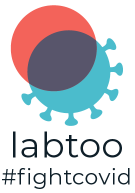Mobilizing The R&D Community on COVID-19
Organize a network of experts for Coronavirus crisis
The world is experiencing a major health crisis and is awaiting a response from Research, pharmas and biotechs to find a vaccine and treatment against SARS-CoV-2 infection and stop the crisis.
The biotech and pharmaceutical ecosystem has been challenged to stop projects on other pathologies and start the race to find a solution to the current crisis.
Part of the ecosystem is ready to invest its resources to find a solution.
Labtoo sets up direct access to service companies (CRO) and research laboratories that have skills and wish to be involved in the fight against the SARS-CoV-2 coronavirus.

How is the Life Sciences ecosystem recovering from the crisis?
Labtoo has surveyed its community of academic and private researchers in order to understand the crisis’ repercussions on the activity of research structures. This survey, carried out in the framework of our COVID-19 initiative, has allowed to shed lights on the post-lockdown consequences of the sanitary crisis.
"This survey really shows a double impact of the crisis on the pharma & biotech ecosystem: on one side, there are those who have benefited from new opportunities to work on COVID-related projects, especially in the academic sector, and on the other side, those who still suffer from delayed or stopped research projects." states Guillaume Leboucher, PhD, CEO & co-founder of Labtoo
- 72% of academic research projects that were delayed or stopped during lockdown have resumed. As a reminder, our last survey from March showed that 77% of surveyed researchers saw a partial or total postponement of their research projects. This figure rose to 85% for projects in the clinical research phase.
- Among these academic projects, 28% of them revolve around COVID-19.
- 71% of academic laboratories have returned to full-time activities since lockdown, with 28% of them that have all or part of their staff still remote working. Our last survey showed that only 28% of academic laboratories were open during lockdown meanwhile 77% of private service providers continued their activity.
- The crisis has brought new business opportunities for 44% of the private service providers (CRO, freelancers, private pharma & biotech companies and consulting agencies) surveyed. However, 79% of them also suffered from a loss of revenue during lockdown, with an imminent peril of their structure for 14% of them.
- In total, 41% of surveyed researchers have troubles to adapt their work environment during lockdown. This shows research structures’ lack of means to properly face the crisis.
Survey conducted from June 25 to July 03 on a sample of 120 researchers
Collaborative map of Covid-19 research projects in France
Labtoo partners with startup Thellie.
The pooling of our offers allows academic researchers to launch a participatory fundraising campaign on Thellie and to identify the best R&D partners for the project in question thanks to our platform on Labtoo.
This allows research projects to be launched much faster and to explore new possible avenues of innovation.


Our 3 axes of collaboration:
- Identifying and mapping research projects: A participatory map of research projects to foster collaboration between researchers and patient access to clinical trials.
- Mobilize a network of experts: The Labtoo service references and makes available providers and support R&D projects on COVID-19.
- Support participatory funding: The Thellie platform to supplement a research budget or initiate the funding of pilot studies in all research disciplines.
What types of services are offered by providers?
We have categorized the different types of services as well as the different applications to which you can respond:
- Drugs: repositioning and new molecules
- Vaccines: development and production
- Diagnosis: SARS-CoV-2 detection kits
Coronavirus drug development
Drug development could be the solution for solving the current crisis quickly. The conditions required to launch a new drug or reposition a drug already developed require significant clinical validation work.
A drug candidate must:
- Demonstrate efficacy against SARS-CoV-2
- Show low toxicity in living organisms
- Going into clinical phase to validate their use against COVID-19
Repositioning can save time in getting a drug to market faster. The amount of time saved can vary depending on how much is known about the molecule or its usage for treatment.
Services for SARS-CoV-2 drug development:
- In vitro tests: to validate the efficacy of a drug on a cellular model
- In vivo assays and models: from efficacy validation to regulatory toxicity
- Immunology: measurement of inflammatory markers and cell
- Samples: serum and specimens
- Biostatistics: study of epidemiological data
- Sequencing and bioinformatics analysis: identification of homologies with known targets and monitoring of virus mutations
- Clinical studies: Recruiting patients to test the drug on healthy or sick individuals
- Regulatory and scientific support: assistance with the filing of regulatory dossiers
Development of vaccines against COVID-19
In many countries, labs are working on vaccine development to stop the coronavirus pandemic. The development of vaccine for COVID-19 will most likely take several months and requires different skills that the ones required from drug development.
Vaccines must take into account the following challenges:
- Being able to demonstrate efficacy at very early stages of development
- Reproduce viral antigens and induce an appropriate immune response
- Anticipate variants of the virus at the time of placing on the market
To accelerate vaccine development and production time, the following services are referenced and available on Labtoo:
- In vitro assays: to validate the immunogenicity and efficacy of a candidate in a cell model.
- In vivo assays and models: from efficacy validation to regulatory toxicity
- Immunogenicity tests: measurement of inflammatory markers
- Samples: serum and specimens
- Sequencing and bioinformatics analysis: identification of homologies with known targets, monitoring of virus mutations
- Regulatory and scientific support: speeding up the drafting of regulatory protocols; assistance in interpreting results
Development of diagnostic kits
It is quite likely that the containment period will result in massive screening of the population for the presence of coronavirus or the markers of its contamination. The screening will be able to determine the risks and precautions to be taken at the end of a health crisis, in order to avoid returning to containment or quarantine of part of the population.
There are two major types of diagnostic tests: serological tests and molecular biology tests (PCR). Serological tests measure the presence of antibodies against the coronavirus, so it is an indication that an immune response has taken place since the body has produced antibodies. Molecular biology tests will demonstrate the presence or absence of the virus in samples by detecting the presence of virus nucleic acids (RNA).
These two types of tests require different experimental capabilities:
For serological diagnosis:
For molecular diagnostics:
How to reference the expertise made available to counter the epidemic?
Labtoo is mobilizing for the fight against Coronavirus by adapting its platform.
We reference the service providers available to work on SARS-CoV-2 Research projects.
Access directly and quickly the services currently available in Europe to advance research projects faster.
Together, let's advance Coronavirus Research.
To reference its services, simply:
- Register or login
- Click on "Publish your Expertise"
- Choose the COVID-19 section and select the service to add
For any question, suggestion or comment, you can contact us.
The impact of the COVID-19 crisis on the Life Sciences Research Ecosystem
The biotech and pharma ecosystem is torn between stopping projects on other pathologies and the race to find a solution to the current crisis.
Labtoo has surveyed its community of Life Sciences researchers in the public and private sectors to find out how the Coronavirus crisis is impacting their activities.
In particular, the study points out the impact on ongoing R&D projects on pathologies other than Coronavirus.
The impact on current projects:
- 77% of the researchers questioned see a partial or total postponement of their research projects. This figure rises to 85% for projects in the clinical research phase.
- Only 28% of the academic laboratories surveyed are open while 77% of the private service providers continue their activity during containment.
- 14% are working on Coronavirus projects and 39% could be working on projects but have not been approached.
- 71% of the private service providers are ready to take on new projects during the containment period, against only 30% for the academic laboratories surveyed.
Internet survey carried out between 20-26 March among 350 Life Sciences researchers in Europe.
Other French ongoing initiatives